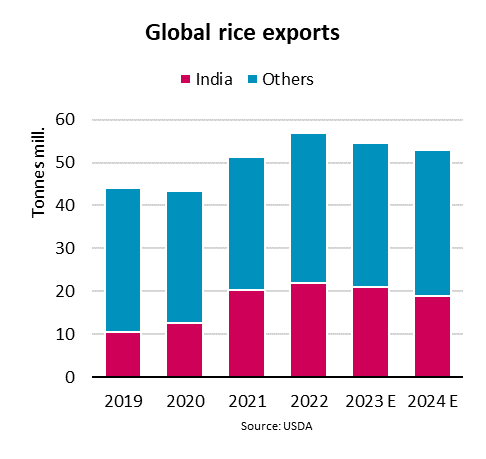“Global rice exports could fall by at least 4% in 2023 because of India’s restrictions on exports and El Niño’s impact on supply. Replacing India’s rice exports is challenging, as India accounts for almost 40% of the world’s export of rice. Low rainfall caused by El Niño is also weakening the outlook for global rice exports in 2024,” says Filipe Gouveia, Shipping Analyst at BIMCO.

To combat inflation and high domestic food prices, the Indian government has gradually restricted rice exports. In July 2023, the Indian government expanded its previous export ban on broken rice to include all non-basmati white rice. This caused global rice prices to rally to their highest level in over a decade. Last week, a minimum price for basmati rice exports was imposed and export duties were added to parboiled rice exports, which could further inflate global rice prices.
Despite concerns that other rice exporters would follow India’s export restrictions, so far only Myanmar has imposed a temporary 45-day ban on exports. Due to the higher prices, other exporters such as Thailand, Vietnam, and Pakistan have instead increased exports. However, this has not been enough to substitute India’s reduction.
“While rice constitutes under 1% of dry bulk cargo, India's export restrictions will add further pressure to the already tight global grain supplies. Overall, we estimate global grain shipments will fall between 1.5% and 2.5% in 2023,” says Gouveia.
Rice is transported by smaller bulk ships in the handysize and supramax segments. Compared to other bulk commodities, rice export volumes are small and there are no large import countries. Due to the lower volume transported to most destinations, rice can also be transported in containers.
According to the United States Department of Agriculture (USDA), global rice exports could decline by an additional 3% in 2024. So far this year, the weather phenomenon El Niño led to a weak monsoon season, bringing less rainfall than usual to South and Southeast Asia. According to the India Meteorological Department, low rainfall could persist in September, further threatening the upcoming rice harvests.
“Despite the weak outlook for rice exports, global grain shipments could recover by between 3% and 4% in 2024. A rise in shipments of feed grains such as maize and soybeans could lead this recovery. On the other hand, tight supplies of food grade grains like wheat and rice could continue to fuel inflation,” says Gouveia.
The opinions expressed herein are the author's and not necessarily those of The Xinde Marine News.
Please Contact Us at:
media@xindemarine.com


 Ningbo Containerized Freight Index Weekly Commentar
Ningbo Containerized Freight Index Weekly Commentar  Ningbo Containerized Freight Index Weekly Commentar
Ningbo Containerized Freight Index Weekly Commentar  Ningbo Containerized Freight Index Weekly Commentar
Ningbo Containerized Freight Index Weekly Commentar  BIMCO Shipping Number of the Week: Bulker newbuildi
BIMCO Shipping Number of the Week: Bulker newbuildi  Ningbo Containerized Freight Index Weekly Commentar
Ningbo Containerized Freight Index Weekly Commentar  Ningbo Containerized Freight Index Weekly Commentar
Ningbo Containerized Freight Index Weekly Commentar